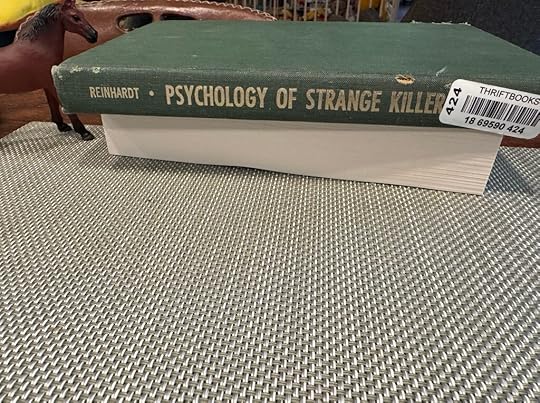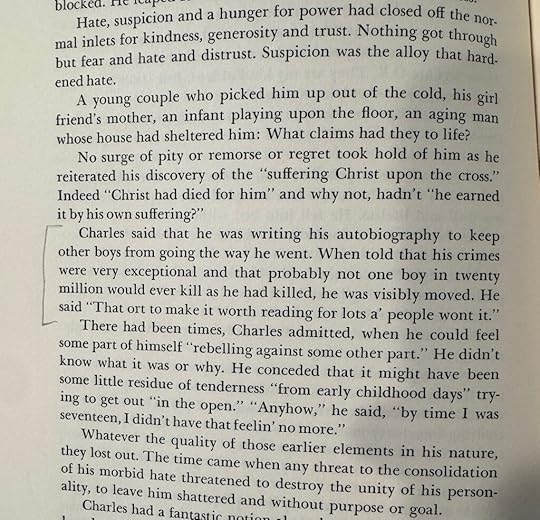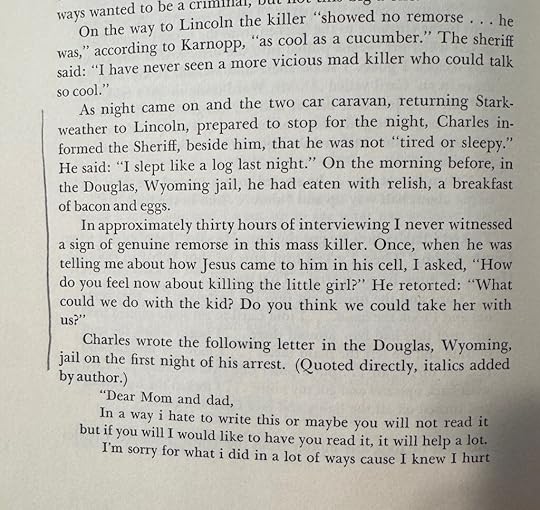The Psychology of Strange Killers

Reader, you can breathe: I found the origin for the Charles Starkweather quote we first found in Larry McMurtry’s Roads. It appears in James Melvin Reinhardt’s book Psychology of Strange Killers. Reinhardt was a sociologist at University of Nebraska, and interviewed Starkweather at length. This particular quote seems to come from a letter Starkweather wrote Reinhardt.
In the death cell he wrote:
“I began to wonder what kind of life I did live in this world, and even to this day, I’m wondering about it, but it don’t matter how much I used to think about it I don’t believe I ever would have found a personal world or live in a worth-while world. They say, this is a wonderful world to live in, but I don’t believe I ever did really live in a wonderful world. There hadn’t been a chance for me to have the opportunity, or privilege, for the best things in life.” What were the “best things in life.” Here they are:
“I haven’t ever eaten in a high class restaurant, never seen the New York Yankees play, or been to Los Angeles or New York City, or other places that books and magazines say are wonderful places to be at.
“Yes, I went out with girls, some were mild dates with nice Christian girls, but most of the girls I went out with, were either the flibberty-biggerty (sic) type, that used too much make-up, and dressed in expensive clothes, or they were the harlot type, that weren’t hard to get a date with, and easy to get along with.
“I had my fights that seem to happen every other day, and like almost everybody, I had my dreams of things I wanted. But of all the dreams, fights, and women to me none of them ever seem to fit in this world. I guess that’s what I meant when I said,
“I didn’t know life, or what it was good for, and the reason I didn’t know, I just didn’t take time to fine out.”
••. Charles invariably showed an affectionate concern for his mother, his sister and younger brothers. Reference to his father,
I have to agree with the magazines Starkweather cites that New York and Los Angeles are pretty good.
Reinhardt’s own life is a reminder that life for pretty much everybody was a lot harder a hundred years ago:
Orphaned at age three, Reinhardt lived with his grandfather. Instead of attending school, he spent most of his young life working, mainly in cotton mills. During World War I, Reinhardt served as a private in the infantry. After the war he went back to school and received his high school diploma at age 22. He then enrolled as an undergraduate at Berea College in Kentucky and graduated in 1923. Reinhardt received his Master of Arts in 1925 and Doctorate of Philosophy in 1929, both from the University of North Dakota.
Never trust these retvrn types – hypermodernity has its problems but for comfiness it’s quite nice.
Reinhardt isn’t sure what to make of Starkweather, even he seems a little baffled. Somehow Charlie comes off as vaguely likeable:

even though among his victims was a two year old girl:

You can see why artists as diverse as Billy Joel, Bruce Springsteen, and Terrence Malick were interested in this story. The movie Badlands seems as meaningful an attempt at understanding as Reinhardt’s book.
Those interested in following this further may wish to acquire Reinhardt’s full length treatment, The Murderous Trail of Charlie Starkweather. Personally I’ve had enough for now.
When they put him in the electric chair Charlie Starkweather tested the straps and asked if they could be a little tighter.



